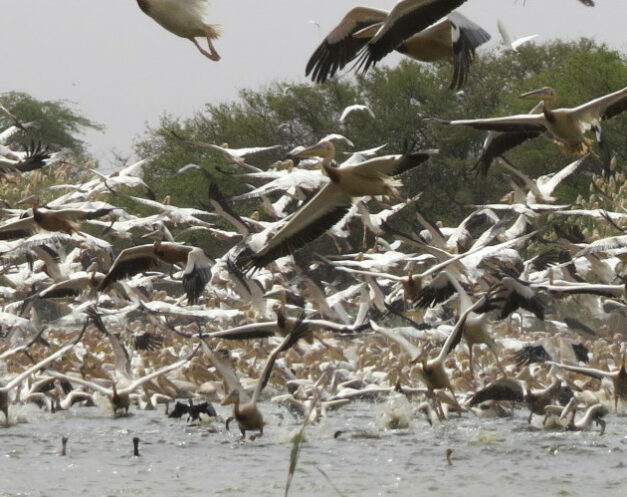From the Arctic to Africa: Protecting Waterbirds and Wetlands

Migratory birds do not mind political boundaries, but they often suffer from lack of international cooperation as they depend on local wetlands in different countries and even continents for their survival. Along the migratory flyway between the Russian Arctic and West Africa we are protecting wetlands and waterbirds. We work both internationally and locally: we bring together people in the countries across the flyway in Africa, the EU and Russia and we develop local conservation strategies.
The Senegal River Delta is situated on the border between Senegal and Mauritania, in a sparsely populated wetland area. It is one of the most important wintering areas for migratory waterbirds from the temperate and Arctic zones of Europe, but it is also important for intra-African migrants.
The Arctic coastal tundra in Northwest Russia, borders the Barents and Kara Seas. It is among the most valuable areas for Arctic fauna including seabirds, waterfowl, waders and marine mammals. The area is sparsely populated and the traditional area of the Nenets people. The development of oil and gas fields is leading to rapid industrialisation of this still largely undeveloped region.
Challenges
Millions of waterbirds migrate each year along the East Atlantic Flyway, spanning an area from the Russian Arctic to South Africa. Migratory waterbirds in particular are vulnerable to wetland loss because they migrate over long distances and are dependent on networks of wetlands along their migration routes, called flyways.
Economic development and easier access to formerly remote areas at both ends of the flyway is putting pressure on important wetlands. Wetland loss is caused by a number of factors, such as unsustainable use, improper water management (containing floodplains behind dams and dykes) or industrial activities such as mining. The birds are locally threatened by hunting and increased disturbance by humans. These birds cross political boundaries. Therefore, overexploitation can only be averted through international coordination and regional conservation strategies.
Achievements
- We engage local people and governments to reduce the threats that cause wetland degradation and loss. This protects habitats for migratory waterbirds while ensuring the ecosystem services provided by these wetlands benefit local communities.
- We investigate areas that are important for migratory waterbirds and nominate unprotected sites. We aim at strengthened monitoring of waterbirds and management of wetlands through local and regional stakeholder involvement, and a networking programme for site managers in Russia, West Africa and the EU.
- The East Atlanticflyway coordination will be improved to increase the information flow from the two sub-regions and the European Union. This will be done through networking programmes that promote exchanges and formal linkages between site managers, such as our Migratory birds ‐ Connecting Wetlands and People.
- Long-term conservation strategies will be developed for two ecoregions that are of critical importance for waterbirds. Together with regional stakeholders, we will develop and start implementing regional conservation and wise use strategies for the two ecoregions. Using existing and new field data, we will identify and promote the designation of internationally important sites as protected areas.
- ThroughTraining of Trainers and other workshops about flyways and migratory birds, site managers in Northwest Russia and several West African countries will have increased understanding of flyway issues and management capacity.
- In the Senegal Delta we work with reserve managers to restore habitats and the life giving flood pulse, thus improve both water quality and conditions for birds to feed.
- In Nenets, we support the government in establishing buffer zones around and improving the conservation status of reserves. Also we lead a stakeholder consultation process, aiming to come to sustainable hunting in the area.
- View the national news story on the training workshop in Senegal (in French).
